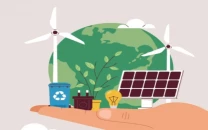The week in focus
The government faces an uphill task to enforce RGST and flood surcharge in an attempt to gather much-needed funds.

It intends to slap the RGST at a uniform rate of 15 per cent compared with the earlier range of 17 to 25 per cent and scrap exemptions enjoyed by certain sectors. Moreover, the government has planned to impose a 10 per cent flood surcharge on income tax paid by individuals and increase special excise duty on luxury items from one to two per cent.
On one side it is being pressed by the International Monetary Fund (IMF) and the World Bank (WB) to embrace tax reforms while on the other side ordinary citizens, businesses, and political parties have expressed their ire against the proposed taxes.
Pakistan Muslim League-N, PML-Q and Muttahida Qaumi Movement have strongly opposed the taxes and vowed to block the passage of the concerned bill in parliament. The government too is playing its cards to muster support from a majority of lawmakers to squeeze the bill through the National Assembly.
If it does go through, the government could expect to generate Rs65 billion from the new taxation measures – to be utilised for reviving infrastructure and livelihood of people displaced by the floods. However, this amount is not sufficient in context of estimates given by the WB and Asian Development Bank after a damage and needs assessment survey.
The two financial institutions have estimated that the country needs around $10 billion for the rehabilitation and reconstruction exercise – a figure endorsed by the Minister of State for Finance Hina Rabbani Khar during a speech in the Senate a few days back.
In order to make available more money, the government has decided to trim the size of its development budget by around Rs200 billion, reduce subsidies and check tax evasion.
More documentation
“It is the need of the hour to impose some additional taxes that will generate funds for relief activities,” said Hamad Aslam, head of equity research at BMA Capital.
He said the salaried class was already paying taxes, but what was worth noting was that the RGST would slash the size of informal economy and bring undocumented businesses under the tax net. “The RGST will bring into its fold the businesses which are either evading taxes or showing less than actual taxable income. This is what the government aims to do by introducing it.”
In order to collect more revenues, there have been widespread calls for widening the scope of tax net to cover the landlords and agriculturists who have been enjoying exemptions because of their influence among political circles. The end of such exemptions will enhance revenues and reduce pressure on the agriculture-based economy.
Aslam, however, said some exempted industries would experience an increase in prices of their products after the imposition of RGST, but it would not be inflationary. Textile, leather, sports goods, surgical items and carpet are the five industries which are currently enjoying exemption from sales tax on local sales and export of their products.
“Inflation is mainly caused by food and fuel prices as well as excessive borrowing and it will not be wrong to say that inflation may get better after the sales tax rate is brought down to a uniform 15 per cent,” he said.
The control over price levels may eventually bring down the State Bank’s benchmark policy rate which currently stands at 13.5 per cent. Introduction of RGST, withdrawal of subsidies and energy reforms will lead to less borrowing by the government from banks, leading to a possible cut in interest rate.
The writer is incharge Business Desk for The Express Tribune.
Published in The Express Tribune, November 15th, 2010.


















COMMENTS
Comments are moderated and generally will be posted if they are on-topic and not abusive.
For more information, please see our Comments FAQ